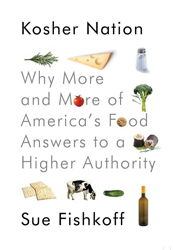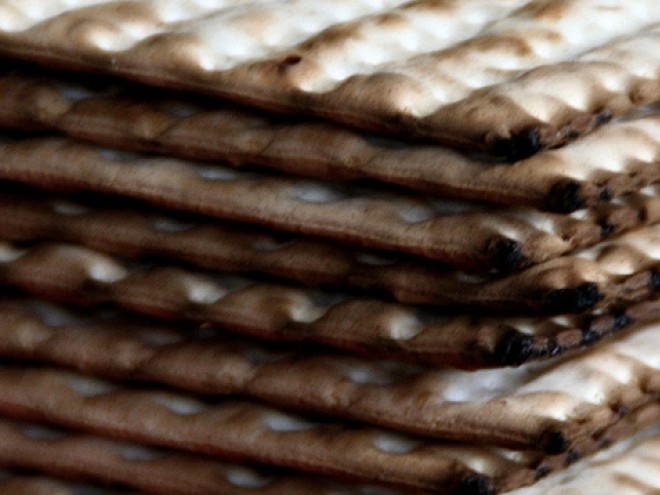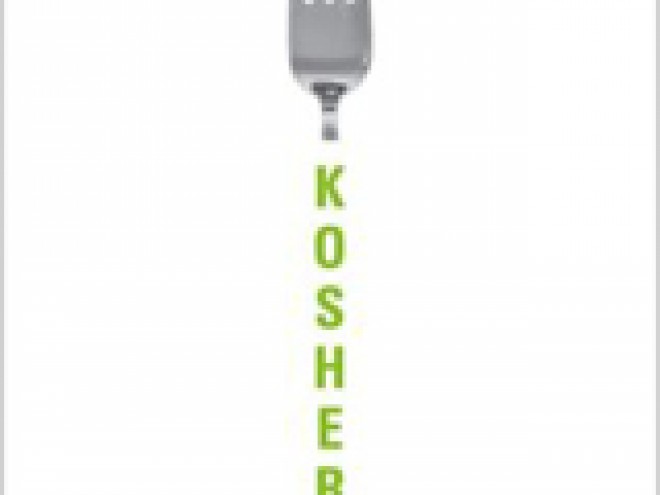On Monday, Sue Fishkoff wrote about people who only keep kosher on holidays. She is the author of Kosher Nation: Why More and More of America’s Food Answers to a Higher Authority.
 The first time I had my hands inside a still-warm turkey, I wondered just how far I was willing to take this business of getting up close and personal with my food.
The first time I had my hands inside a still-warm turkey, I wondered just how far I was willing to take this business of getting up close and personal with my food.
I was at an organic turkey farm an hour and a half north of San Francisco with two dozen other volunteers on a wet, cold winter morning in December 2008, preparing what would become the main entrée for the Hazon Food Conference’s Shabbat dinner later that week. We stomped around in the drizzle and fog, as organizer Roger Studley explained what we were about to do.
“We’re doing this old-school and hands-on,” he stated. “We’re doing it as a community, making meat for the conference we are about to attend. This is a project bringing us closer to the source of the food we are eating, making real the fact that we are taking the lives of animals in order to sustain ourselves.”
The annual Hazon conference is the preeminent national gathering of activists in the new Jewish food movement, a growing family of mainly younger Jews who want to make food choices that are in line with Jewish values as well as their moral and political beliefs concerning workers’ rights, good health, humane treatment of animals, environmental protection, and food access for the poor. This laundry list of concerns makes it difficult to feed a conference of 600 hungry people, something the organizers discovered earlier that summer when they debated whether to include meat at all for a gathering that typically includes so many hardcore vegetarians.
The choice was made — Shabbat isn’t Shabbat without the option of a roast bird — so there we were, watching shochet Andy Kastner grab the first turkey and slit its neck with a quick back-and-forth motion of his carefully sharpened knife.
Kastner was still in rabbinical school — he’s now the Hillel rabbi at Washington University in St. Louis. I’d met up with him a few months earlier at a kosher goat slaughter in a Connecticut field, and he’d shared his thoughts as he skinned and eviscerated his first mammal. It was, he admitted, not an easy experience.
By December he had more practice, and the turkey shechting went smoothly. The rest of the group split into two, with half of us assigned to hang up the just-slaughtered birds and pull out their feathers, while a smaller, braver group did the evisceration, pulling out the internal organs and plunging the turkeys into a plastic bin filled with water. To kasher and prepare the the birds, we had to soak them for half an hour, then cover them in salt for another hour, rinse them three times, and seal and pack them up for transport to the convention center.
The ground inside the storage shed where we worked quickly filled with flying feathers. As I concentrated on my task, I noticed that each bird I plucked felt farther removed from the living animal it had so recently been. Was that something my own consciousness was doing, to protect my emotions? Or was it the same phenomenon I observed when I worked on an assembly line in a kibbutz factory, where after a while automation leads to objectification?
 I also thought about my grandmother, who bought her chickens from a kosher butcher in Perth Amboy, New Jersey, glad they were already plucked and gutted. How she would have shook her head and laughed at us, a bunch of city folk with romantic notions about the beauty of killing and cleaning our own meat. Who needs it, she would have chuckled.
I also thought about my grandmother, who bought her chickens from a kosher butcher in Perth Amboy, New Jersey, glad they were already plucked and gutted. How she would have shook her head and laughed at us, a bunch of city folk with romantic notions about the beauty of killing and cleaning our own meat. Who needs it, she would have chuckled.
But that Friday in the dining hall, when I looked at the roast turkey leg on my plate, I felt a giddy sense of pride. I found myself eating more slowly, savoring each bite as I remembered the hours of hard work involved in getting that bird to this table. I thought about the Jewish tradition of honoring the Shabbat by serving the best food one can afford, including meat, even if one avoids it the rest of the week. And I was struck once again by how Judaism takes note of the eternal cycle of life and death, commanding us to bless the food that sustains us before we put it into our mouths.
And it all made sense.
Sue Fishkoff’s new book, Kosher Nation: Why More and More of America’s Food Answers to a Higher Authority, is now available. Come back all week to read his posts for the Jewish Book Council and My Jewish Learning‘s Author Blog series.


